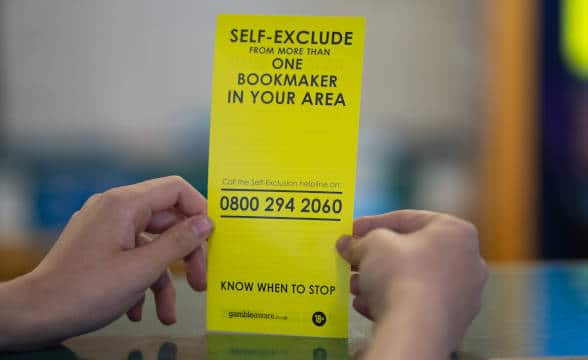- Casino
- By State
- Alabama
- Alaska
- Arizona
- Arkansas
- California
- Colorado
- Connecticut
- Delaware
- Georgia
- Florida
- Hawaii
- Idaho
- Illinois
- Indiana
- Iowa
- Kansas
- Kentucky
- Louisiana
- Maine
- Massachusetts
- Maryland
- Michigan
- Minnesota
- Mississippi
- Missouri
- Montana
- Nebraska
- Nevada
- New Hampshire
- New Jersey
- New Mexico
- New York
- North Carolina
- North Dakota
- Ohio
- Oklahoma
- Oregon
- Pennsylvania
- Rhode Island
- South Carolina
- South Dakota
- Tennessee
- Texas
- Utah
- Vermont
- Virginia
- Washington
- West Virginia
- Wisconsin
- Wyoming
- By State
- Slots
- Poker
- Sports
- Esports
GambleAware Launched Prevention Campaign for Gambling Women

UK Gambling harm charity GambleAware is launching a prevention campaign aimed at women who may be struggling with problem gambling and worried to seek help.
Winter Traditionally Associated with Spike in Gambling
The new campaign will be seeking to raise public awareness that there is vital support available for women experiencing excessive gambling, and it is GambleAware’s response to a survey that showed that 24% of UK women at the age between 18 and 49 who gamble expect to increase their gambling spending in the coming months due to the rising costs of living.
In addition, 12% of women who gamble revealed they had turned to gambling to create extra household income, and 21% have been experiencing health challenges such as anxiety and stress, growing fears that the upcoming winter, which is a traditional time of the year associated with a spike in online gambling, gambling harm among women may increase.
Worried over the serious concerns raised by this new research as a sign of a potential increase in the “scale of gambling harm over the coming months,” Zoë Osmond, chief executive of GambleAware highlighted the importance of raising women’s awareness of the risks of gambling. Osmond also stressed that the growing number of women who gamble online may create “a perfect storm which may lead to a rise in the number of women experiencing gambling harm.”
“We must break down the pervasive stigma that prevents too many women from seeking out vital support,” Osmond stated, advising those women who are worried about their gambling or starting to lose track of time or spend more than they can afford, to seek help at BeGambleAware.com or via the National Gambling Helpline.
Stigma and Shame Block Women from Seeking Support
Based on the responses from 1,600 women who gamble, the survey revealed that stigma and shame around gambling are blocking women from seeking support: 32% of them would be reluctant to share their gambling-related concerns with a family member or a loved one, and nearly half of them, 49%, pointed to shame as the reason for their reluctance. In addition, 63% of women believe that gambling is less acceptable for them rather than men while 19% were hiding their gambling or downplaying it.
Dr. Linda Papadopoulus, leading psychologist and spokesperson for the GambleAware campaign that seeks to challenge the stigma around women who gamble and encourage them to seek support before early problem gambling signs escalate, outlined that, though difficulties related to initiating a conversation are understandable, “suffering in silence increases feelings of isolation.”
“Help is often just a conversation away so if you are worried about yourself or a loved one, speak up and reach out,” she added, turning to those who are reluctant to share their gambling concerns.
The survey also revealed that approximately a quarter of the respondents were already experiencing signs of gambling harm such as losing track of time, 22%, spending more money than expected, 39%, and gambling in solitude so that the behavior remains hidden from the eyes of others, 25%.
As part of the GambleAware campaign, a new dedicated online resource on the begambleaware.com website that offers practical advice on how to initiate conversations has been launched.
Related Topics:
With 5+ years of experience as an analyst, Julie—affectionately known as 'Jewels' in the office—has quickly become our go-to expert in the forex and cryptocurrency space. Her keen attention to detail and deep understanding of the industry make her an invaluable asset. Julie's expertise and enthusiasm have made her the top choice to co-pilot educational initiatives alongside Mike, bringing knowledge to the masses.
Previous Article

Industry
September 22, 2022
PGCB Fines Casinos for Underage Gambling and License Issues

Next Article


Industry
September 22, 2022
Gaming Machine Trading Hours Breaches Cost NSW Hotel AU$40K
Must Read
Industry
June 27, 2025
Las Vegas Sphere Bashed for Charging $170 for Pizza
Industry
June 30, 2025
New Zealand Presses On with iGaming Legislation
More Articles















